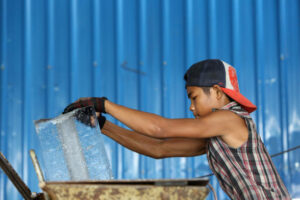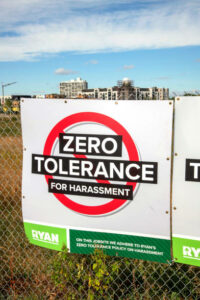
Melbourne doctor kept refugee as slave
Modern slavery in Australia may be more widespread than you think. According to the 2023 Global Index, there are approximately 41,000 people living in modern slavery in Australia. Industries reported as highest risk for slavery include hospitality, cleaning, food processing, construction and agriculture.
While Australia has tens of thousands of individuals working in slave conditions, the vast majority of these cases go unreported. In the financial year ending 30 June 2022, the Australian Federal Police received only 294 reports of modern slavery. This was, however, the highest number of reports ever received in a single year.
Figures from Anti-Slavery Australia show that between 2004 and 2021, 1,670 modern slavery cases were reported to the Australian Federal Police. Of these, only 31 offenders were convicted. Over a quarter (28 per cent) of these cases involved forced marriage, while just under a fifth (18 per cent) involved sexual exploitation. Forced labour accounted for 14 per cent of cases.
Employers face years in jail for slavery charges
It goes without saying that many Australian employers and individuals are not brought to justice. The ones who are, however, face severe punishment. In January 2024, a Melbourne doctor was jailed on slavery charges for forcing a refugee to work for free in his shop. While in 2023, a Melbourne woman was jailed for over ten years, and her husband for six years, for enslaving an asylum seeker in their home.
In this article, we’ll explore these cases and look at how the federal Modern Slavery Act is helping prevent the exploitation of people in Australia and overseas.

What is modern slavery?
Modern slavery is a term that generally includes a number of exploitative practices. This includes slavery itself and slavery-like practices. Also, human trafficking, child labour, forced labour and forced marriage. There is no agreed legal definition of modern slavery among nations and non-government organisations globally. The International Labour Organisation and United Nations have different definitions of the term.
In Australia, the Commonwealth Criminal Code Act 1995 criminalises a range of practices that are typically associated with modern slavery. Among these are:
- Slavery: Where a person exercises ownership rights over another. This includes by the use of coercion, threats or deception. The offense of slavery carries severe penalties, including imprisonment for life.
- Servitude: The exercise of ownership rights over a person, including compelling them to perform services via coercion, threats or deception. The offense of servitude is also punishable by severe penalties, including imprisonment for up to 25 years.
- Forced Labour: Involves requiring a person to perform work against their will via coercion, threats or deception. Forced labour carries significant penalties, with imprisonment for up to 25 years.
- Debt Bondage: Involves causing a person to enter into or remain in a situation where their labour is provided to pay a debt, and the debt is not reasonably clear. The maximum penalty is imprisonment for up to 25 years.
The Commonwealth Criminal Code Act also criminalises deceptive recruiting for labour or services and human trafficking.

“Pernicious” Melbourne doctor jailed on forced labour charges
One person who was recently punished under the Commonwealth Criminal Code Act 1995 was Dr Seyyed Farshch. In January 2024, the 50-year-old was sentenced to a three year and six months jail term on modern slavery-related charges. He will be required to serve a minimum of 18 months in jail. Dr Farshch was also ordered to pay $42,989.82 to his victim.
The Victorian County Court found him guilty of forced labour offences. Dr Farshch had forced an Iranian refugee to undertake “physically taxing work” at the Candoo Confectionary store in Melbourne’s Box Hill, which he owned.
Dr Farshch subjected his victim to forced labour conditions between 2015 and 2017. The refugee was forced to work without pay for the first three months. He was then paid just $10 per hour and faced threats from Dr Farshch when he complained about his conditions.
Doctor manipulated victim with “carrot and stick” approach
The court labelled Dr Farshch as “calculated, manipulative and pernicious” and said that he exploited the refugee’s “extreme vulnerability.” It said that he had taken advantage of the refugee’s lack of knowledge of his rights.
It was found that Dr Farshch had used a “carrot and stick” strategy to keep his victim working. He had promised that he would assist the refugee in securing a visa. But at the same time, Dr Farshch claimed he had “connections” in immigration, and would threaten to inform the authorities that he was working illegally.
The victim was “terrified” of being sent back to Iran, where he faced religious persecution for converting to Christianity. He believed that if deported, he would be “sent back to the detention camp.” He also feared that he would face the death penalty.

Victim threated with being thrown into the ocean
The court found that Dr Farshch’s threats to the refugee were “usually made in private.” This included once telling his victim that he would put a bag over his head and throw him into the ocean.
“Your offending behaviour was unambiguous, the threats you made were explicit in nature, were repeated many times and over a protracted period of time,” the court stated to Dr Farshch. “You were acutely aware … and must have meant this outcome.”
Melbourne couple jailed on modern slavery charges
Another shocking Australian case of modern slavery was revealed in 2021. Kumuthini Kannan and her husband Kandasamy Kannan were jailed for 10 years and six months and six years respectively. The couple were also ordered to pay their victim $485,000 in unpaid wages.
Mr and Mrs Kannan had for eight years forced an Indian refugee of Tamil origin to a life of domestic servitude, paying her just $3.36 per day. The woman, who was aged in her sixties, was forced to work up to 23 hours per day looking after the couple’s children in their home in Mount Waverly, Melbourne. Two of their children have high-functioning autism while the third is severely psychologically disabled.
The victim was told by the married couple never to leave their house nor talk to anyone outside of the family. And that she would be punished if she did. The victim did not speak English and she had her passport stolen from her by the Kannans. During this time, a relative of the victim who lived in India emailed the Kannans requesting that they let her go. The married couple simply replied “f**k you.”

Squalid conditions and physically assulted
The refugee started working as a slave for the couple in 2007. She lived in squalid conditions and was physically assaulted. In July 2015, she was found by Mrs Kannan lying on the bathroom floor. But she left the victim there and went to attend a school concert. It was only after she returned home that she called emergency services.
Once at hospital, the victim was diagnosed with severe malnourishment, diabetes and gangrene of the feet and hands. It was found that she had been suffering from sepsis and that she weighed just 40 kilograms. It was at this point that investigations took place into her living conditions, ultimately revealing that she had been living as a slave.
Refugee assaulted with boiling water, frozen chicken
In addition to not being paid, the victim was forced to suffer an extreme level of inhumanity. In recorded evidence, she detailed how Mrs Kannan “will take a chicken, frozen chicken, and hit (it) on my head.” She also explained how she would throw wine and boiling water on her.
“She’ll be drinking and then she will throw it on my face. When it’s bubbling she will put it on my leg,” she said.
Mrs Kannan had originally been sentenced to 8 years in jail for her crimes. But it was later found that she had attempted to pervert the course of justice. After being charged with slavery offences in 2016, Mrs Kannan had called the victim to threaten her not to provide evidence during the court proceedings. In June 2023, Mrs Kannan was handed an extra two and a half years to her prison sentence. She has a non-parole period of four years, while Mr Kannan has a non-parole period of three years.

How Australia has taken action with the Modern Slavery Act
These cases of modern slavery in Australia are truly shocking. And while there are tens of thousands of unreported cases nationwide, it pales in comparison to other countries. The 2023 Global Index estimates that there are 50 million people working as slaves around the globe.
One recent piece of Australian legislation that attempts to combat slavery locally and overseas is the federal Modern Slavery Act 2018. The Act came into effect on 1 January 2019. It is designed to combat modern slavery by promoting transparency and accountability of Australian businesses. It essentially mandates certain businesses to ensure that their operations or supply chains – whether overseas or local – are free of modern slavery.
The legislation defines modern slavery based on definitions contained in the Commonwealth Criminal Code Act 1995 and international law. This includes slavery or slavery-like offences covering forced labour, debt bondage and deceptive recruitment. Also, human trafficking and the worst forms of child labour. The Act requires entities to consider the risk of these practices falling within their operations or supply chain both locally and overseas.

What are the Modern Slavery Act requirements?
The Act imposes modern slavery compliance obligations on Australian-based organisations or those with operations in Australia. Specifically, organisations with a minimum consolidated revenue of $100 million. Entities that do not meet this revenue criteria are able to voluntarily comply with the Act. Key features of the Modern Slavery Act in Australia include:
- Reporting requirements: Entities must prepare and submit an annual Modern Slavery Statement to the Minister for Home Affairs. The statement must outline the steps taken by the entity to address modern slavery risks in its operations and supply chains locally and overseas.
- Supply chain transparency: Businesses covered by the Act are expected to identify and assess the risk of modern slavery in their operations and supply chains. They are encouraged to take steps to mitigate these risks and address any instances of modern slavery.
There are, however, no penalties for entities that fail to comply with their Modern Slavery Act obligations. But those who do not can face reputational damage. The Minister for Home Affairs has the ability to publish information about an entity’s failure to comply on the Modern Slavery Statement Register.
A 2023 review of the Act recommended the introduction of penalties for compliance violations. It also prescribed lowering the reporting threshold from $100 million to $50 million, amongst other recommendations.

Conclusion to: Jailed for modern slavery
Call Australia’s leading workplace mediators A Whole New Approach. Our highly experienced team can help you hold your employer to account and seek justice via the Fair Work Commission. We help Australian workers in every state and territory with unfair dismissal and adverse action claims. If you have faced workplace discrimination, bullying or sexual harassment, get in touch.
Our team has assisted over 16,000 Australian workers to lodge unfair dismissal or adverse actions claims. We understand the inner workings of the Fair Work Commission, so we can help you get the best result. We are not lawyers but the nations leading workplace advisors and commentators. the staff are proud of who they work for and the poutcomes they get for our clients.






